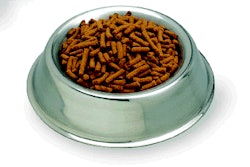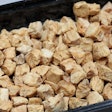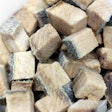A new report from the Intergovernmental Panel on Climate Change, a group of international scientists, shows "unequivocal" evidence of global warming and links it with 90% certainty to human activity, especially manmade greenhouse gases (see www.ipcc.ch ). Just before the report was released in early February, US President George W. Bush called for quintupling production of biofuels such as corn ethanol by 2017.
If that happened, it would expand an ethanol industry that already has 113 US plants, with 78 more under construction, says the Renewable Fuels Association ( www.ethanolrfa.org/industry/locations ). Of the plants online, all but a few use corn as the main or only source of biomass.
What about petfood?
On p. 72, Peter Best discusses difficulties of European petfood producers as common ingredients are increasingly being used to make fuel. I've heard this from US producers trying to control commodity costs that are rising from the escalating use of starch crops like corn to produce ethanol. Even petfoods that don't include corn suffer a trickle-down effect, because starch crops have traditionally been feedstock for animals from which meat ingredients derive. So, the low availability of corn increases demand and, thus, prices for other ingredients.
Even the National Corn Growers Association (NGCA), which touts the "ethanol sector's rapid ascent" as the "greatest success story in modern agriculture" (see www.ngca.com ), acknowledges the impact. "Ethanol production makes huge amounts of the nation's corn disappear (some 1.4 billion bushels went into ethanol production in 2004), and that affects overall corn supply and helps shore up corn prices nationwide," reads NGCA's website.
This is not necessarily good for other industries. Shortly after Bush made his call for more renewable fuels, Tyson Foods warned that increasing US ethanol production would lead to higher global food prices, according to a January 30 Financial Times article. In Mexico, the price of tortillas, a staple, has doubled over the last year, said a February 1 Associated Press article.
Though large ethanol producers like Archers Daniels Midland, cited in the Financial Times article, insist better technology will boost corn yields to meet the increasing demand, some scientists say ethanol lacks even potential to ameliorate greenhouse gases and global warming because making it takes more energy than what it creates in fuel savings. In a 2005 San Diego Union-Tribune article, David Pimental, a Cornell University ecology professor, was quoted saying it takes 1.29 gallons of gasoline to produce enough ethanol to replace 1 gallon at the pump.
Cracking the code
Many other sources of biomass besides corn exist. The US Dept. of Energy, via its Alternative Fuels Data Center ( www.eere.energy.gov/afdc/altfuel/ethanol.html ), says advanced bioethanol technology allows fuel to be made from cellulosic biomass, such as agricultural residues, industrial waste, municipal solid waste, trees and grasses. That includes low-value plant materials like corn stalks, sawdust or waste paper.
Brazil has become the world's largest producer of ethanol by capitalizing on its sugarcane crop, also the largest. According to Wikipedia.com , sugarcane is a more efficient source of fermentable carbohydrates and is easier to grow and process than corn, especially in Brazil with its ideal climate.
Why not turn the tons of manure produced by livestock, which often presents an environmental hazard and a large cost to farmers, into fuel? Then there are also non-biomass sources like wind, solar and hydrogen power. True, these and most biomass alternatives have a common problem: No one has yet cracked the code for mass production at a viable cost. But for petfood and other industries, they share the advantage of not monopolizing a valuable food source for questionable benefit.
















